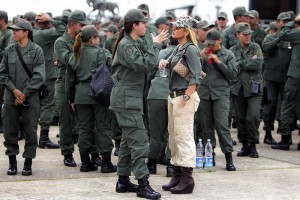Conscription Drive Follows Nationwide Civilian-Military Drills

TODAY VENEZUELA – The youth wing of the governing United Socialist Party of Venezuela (JPSUV) and the 13,000 Units of Battle Hugo Chávez are to pass the master list of their members to the commanders of the National Bolivarian Armed Forces (FANB) in order to enlist them in military garrisons, according to reports published in Venezuelan daily El Nacional on Monday.
Since the US government declared Venezuela an “unusual and extraordinary threat” in March, Venezuelan President Nicolás Maduro has been preparing a “civilian-military offensive” with the stated aim of defending the country from a possible invasion by the United States.
According to El Nacional, the 23 military districts of the country are creating “anti-imperialist groups” formed by young pro-government activists prepared to become soldiers and defend Venezuela through force of arms. Maduro has meanwhile ordered civilian groups and the FANB to participate in joint exercises for defense purposes.
Ongoing moves to integrate political organizations into defense structures may contravene the Venezuelan Constitution, which stipulates in Article 328 that “the National Armed Forces (FANB) constitute a professional institution by their essence, free from political activism, organized by the state to guarantee the independence and sovereignty of the nation.”
Nevertheless, on Saturday, March 14, all young government supporters in Carabobo State were called to attend the nearest FANB barracks and enlist in the National Militia, in a conscription drive authorized by its commander Major General Yorman Rubio.
Rodolfo Crespo Grismaldo, JPSUV vice president for the state’s central-eastern region, called on young members of the party to enlist in defense of Venezuelan sovereignty.
“We have to organize our people, mobilize them, and create the necessary conditions to defend our country from the interventionist aggressions of the North American government; it’s important that the Venezuelan youth are ready to defend our sovereignty,” Crespo argued.
On March 28, students at the Andrés Eloy Blanco Politechnic Territorial University similarly announced the formation of a “student militia.” They hope to receive FANB support and military training for its members.
Venezuela’s National Bolivarian Militia is a military body composed solely of citizens, who sign up to service in situations of emergency or armed conflict without receiving a regular salary or committing to a fixed term of duty. Former President Hugo Chávez formally created the body in 2007 to serve as an auxiliary body to the FANB.
However, for Rocío San Miguel, president of Venezuelan civil-society organization Citizen Control, Venezuela’s emerging civilian-military union “is fundamentally based on situations that violate the Constitution,” and seeks to politicize the armed forces and further cement their loyalty to Chávez’s cult of personality, in what he branded “an absolutely unconstitutional equation.”
War Games

Both the governments of Chávez and his successor Nicolás Maduro have sought to reinforce links between the army and citizens, thereby creating greater executive control in different institutions and contexts throughout the country.
On March 14, 80,000 soldiers and 20,000 civilians participated in exercises across the country at sea, land, and air. The objective was reportedly to show a mobilized population in defense of national sovereignty against the alleged “war” declared by Washington on Venezuela.
The government broadcast via national TV channels simulations of aerial bombardments, acts of sabotage, kidnappings, and forced evictions. FANB forces joined civil-society groups and various militia organizations in recreating the potential effects of a US invasion.
In a simulation held in Apure States on March 14 during the same Special Defense Exercise, an armored vehicle fell into the Río Sanare while on maneuvers, killing one soldier and injuring two others.
Some Venezuelans took to Twitter to denounce reported instances of make-shift equipment, and a lack of preparation and seriousness by FANB and militia units.
On March 10, the authorities also inaugurated in Bolívar State the Body for the Internal Defense of Sovereignty, created to “confront imperialism, accompany President Nicolás Maduro, and defend the fatherland with honor against any circumstances,” according to the unit’s leader Francisco Rangel Gómez.
Rangel Gómez explained that the militia organization would work together with civilian and military authorities, adding that Venezuela’s enemies would “never be able to detain the revolution and break the sacred link between the people and their soldiers.”
The wave of civilian-military activity is not the first instance of the Venezuelan government mobilizing its citizens against alleged internal and external threats.
In February 2015, Maduro created the Popular-Civic Military Commands, units composed of PSUV supporters and FANB forces, to combat an alleged “economic war” led by the Venezuelan opposition and financed by the United States.
The Commands work in collaboration with the Patriotic Cooperatives, which reportedly denounce anonymously opposition activists or private business owners who are thought to be working against the government. These quasi-legal bodies in turn serve as key but unexamined witnesses during judicial proceedings, and the Venezuelan opposition has denounced them as a means of government persecution.
Jonatan Alzuru Aponte, former director of the Center of Post-Doctoral Research at the Central University of Venezuela (UCV), described the Cooperatives as illegal and illegitimate.
“The judicial power takes up the anonymous denouncement and acts without proven guilt to detain the accused. The anonymous witness doesn’t participate in the process, and doesn’t offer the evidence personally — instead the state prosecutor takes charge of promoting their testimony,” Alzuru Aponte argued.
The academic made reference to the case of Rodolfo “The Aviator” González, an opposition figure who prison officials found dead in March in his cell in the headquarters of the Bolivarian Intelligence Services (SEBIN), a year after his arrest.
González, 63, was imprisoned following a declaration made by a cooperative member that he was behind violent activities during 2014’s anti-government protests. The witness remained anonymous, and never presented evidence to support their claim.













